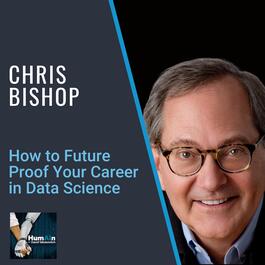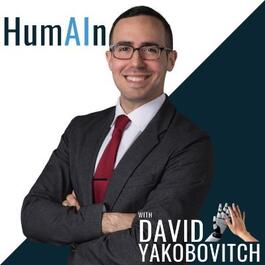
How to Future Proof Your Career in Data Science with Chris Bishop
[Audio] Podcast: Play in new window | Download Subscribe: Google Podcasts | Spotify | Stitcher | TuneIn | RSS Chris Bishop has a degree in German Literature from Bennington College. He started music after getting out of school.He ended up in the jingle business, writing music for television. Then he became intrigued by the web and taught himself to be a web producer and worked at a couple of seminal interactive agencies in New York. He was hired by IBM into their fledgling corporate internet programs division. He is a TEDx speaker, ex-IBMer, former NYC studio cat, future workplace consultant, and a firm believer in the power of focusing on the fringe. Based on his own nonlinear, multimodal career path he’s developed a workshop called “How to succeed at jobs that don’t exist yet” designed to excite and empower today's learners as they navigate the global borderless workplace.His session provides insight into how to deliver business results and pursue successful careers leveraging emerging technologies including quantum information science, AI, data science, fintech, cryptoassets, blockchain, augmented/virtual reality, genomic editing, and robotics. Episode Links: Chris Bishop’s LinkedIn: https://www.linkedin.com/in/christopherbishop123/ Chris Bishop’s Twitter: @chrisbishop Chris Bishop’s Website: https://improvisingcareers.com/ Podcast Details: Podcast website: https://www.humainpodcast.com Apple Podcasts: https://podcasts.apple.com/us/podcast/humain-podcast-artificial-intelligence-data-science/id1452117009 Spotify: https://open.spotify.com/show/6tXysq5TzHXvttWtJhmRpS RSS: https://feeds.redcircle.com/99113f24-2bd1-4332-8cd0-32e0556c8bc9 YouTube Full Episodes: https://www.youtube.com/channel/UCxvclFvpPvFM9_RxcNg1rag YouTube Clips: https://www.youtube.com/channel/UCxvclFvpPvFM9_RxcNg1rag/videos Support and Social Media: – Check out the sponsors above, it’s the best way to support this podcast – Support on Patreon: https://www.patreon.com/humain/creators – Twitter: https://twitter.com/dyakobovitch – Instagram: https://www.instagram.com/humainpodcast/ – LinkedIn: https://www.linkedin.com/in/davidyakobovitch/ – Facebook: https://www.facebook.com/HumainPodcast/ – HumAIn Website Articles: https://www.humainpodcast.com/blog/ Outline: Here’s the timestamps for the episode: (00:00) – Introduction (04:38) – The U.S Bureau of Labor and Statistics says today's learners will have 8-10 jobs by the time they're 38. They're going to use technology that doesn't exist today. I connected with a gentleman from LinkedIn Learning and he said, I think your content would be valuable to the LinkedIn Learning audience and here we are. (06:18) – People can work from home or from wherever on the train or in a Starbucks and be more productive, because they're more in control of their time. Data science is going to have lots of opportunities to take these learnings, as you said about education. The opportunity again, for data science to rethink how information is shared and distributed represents a huge opportunity. (08:36) – The idea is that humans have been creating devices to make work simpler and faster and easier for literally thousands of years. There's lots of history and precedents for the kinds of tools that led to humans manipulating data, that is what we do today with algorithms and using artificial intelligence and machine learning. So it is part of a long arc that goes back thousands of years and is going to continue for thousands of years. (11:38) – An interesting example to share is the New York Stock Exchange. That space is basically a catering hall now, because there are algorithms that are doing most of the trading. There are certainly people in there doing work, but back to your comment about math, algorithms can make assessments and recommendations, buy and sell way faster than a human can. So that's the model, it is like, let's use tools that will help us move faster, work better, work more efficiently and improve productivity. (12:24) –We are also seeing AI being used to help radiologists examine X-rays. A lot of data science is being put into the unfortunately scrubbed mission today, but hopefully we'll see the SpaceX launch. That's going to open up incredible opportunities for data scientists, not just around NASA and ancillary businesses. (14:41) – Everything is generating data now and the idea is that data is empowering. It can also be disabling. And there are certainly conversations about privacy and confidentiality. At the end of the day, the ability to capture data and represent it accurately is a good thing. Using tools like AI and machine learning, we can take that data and make sense out of it and rationalize it, not only to live more comfortably, but also to drive innovative business models. (16:17) – Interesting new careers, jobs and certainly in data science are emerging at the intersection of unlikely or historically disconnected disciplines. So by that, an example I cite is Nanopharmacy. So they're now creating ingestible bots that can carry Pharmacology at the atomic or molecular level, to the affected area, to the tumor or to the wound or to the area where the medicine is needed. All that kind of science that's going on now in these crazy times is going to be expanded. it is going to set models and precedents for how medicine is created and delivered, how healthcare and biomedicine is created going forward (19:05) – My toolkit is me reflecting on how I navigated these careers and trying to codify them into these future career tools. I call them voice antennas and mesh. Technology is a source of information about future tech and culture. So that's the antenna piece. And then the third piece is mesh, which I like to describe as a three-dimensional data visualization of your network. (23:17) – First of all, get into a disciplinary vertical that you're interested in, a topic area that you're passionate about because then you'll be successful if you're interested in it and then find ways to step back and provide more strategic higher level business perspective, and respect the fact that you are knowledgeable, more than you think about how say a business is run and some it is not for everybody. I would encourage data scientists again, as this is such a rapidly evolving and morphing field to think about how to move up into say a management role or a strategy role, to not be afraid to contribute ideas about solutions for innovative products and services that a company might take on to drive their business model. (26:11) – There's lots of sources of information and the bad news is there's lots of really good sources of information. So, managing, parsing and doing triage on the tsunami of info is the challenge. The implication is that these are topic areas you're interested in. The broader implication is, it represents focus areas for a data science career. (28:40) – Learning is key. I heard it stated by some writer recently that we have to stop thinking of education as an event that happened in time. Education is something that goes on your whole life. It never ends, especially in this environment. In the second decade of the 21st century learning is a non-stop process. Just like networking. it is the old adage described to showbiz, but true in every business. Now it is not what you know, it is who you know, so building your mesh is critical. (33:13) – My general advice, certainly to all careerists, but definitely to data scientists has always been and served me well, is, chase the maelstrom, find the chaos, go for the mayhem. So go where they don't know what it is yet. And then you can be involved, you can have a creative role, you can do something interesting and innovative and be employed gainfully and be remunerated. (34:48) – I went into this web thing and it served me well. It was an emerging technology that people didn't quite know what to do with it. And people from all different kinds of disciplines and backgrounds were getting into it. So fast forward to 2020, the areas where I've encouraged data scientists to focus on, are things like certainly AR and VR. In the education space and in the medical space and then even in financial services, I would encourage them to investigate crypto assets, blockchain, and bitcoin. These are all going to be big opportunities, certainly 3D printing. Biotech, certainly education, almost everything you can think of is being transformed by technology and the implications are on data science. Advertising Inquiries: https://redcircle.com/brands Privacy & Opt-Out: https://redcircle.com/privacy
From "HumAIn Podcast"




Comments
Add comment Feedback